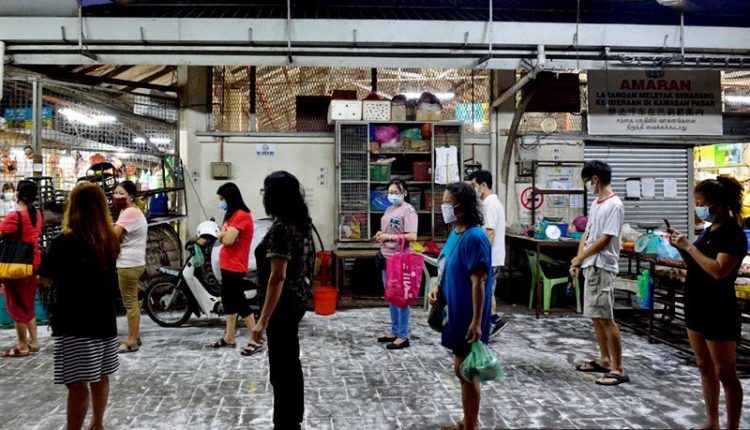MCOs inflict devastating damage on the individual, family, community and national economic activity, severely impacting daily livelihoods and driving families and communities to below the poverty line.
-Advertisement-
With the health ministry’s (MOH) embargo on Covid-19 data, it is virtually impossible to decipher the rationale for extending the CMCO from Nov 9 to Dec 6.
What is the matrix used by the National Security Council (MKN) or MOH to justify the extension? We searched extensively for the science behind the move, to no avail.
Assisted by our Public Health (PH) and Infectious Diseases (ID) colleagues, we would like to offer data and trends captured from MOH’s statistics in the public domain that make the CMCO untenable.
Understanding the data
Absolute numbers of Covid-19 cases in any one state is not a useful parameter. It needs to be expressed as a proportion of the state’s population.
The Infectivity Rate (IR) by state is the number of active Covid-19 cases per 1000 population. The IR in the Klang Valley, Selangor (0.295), Putrajaya (0.294) and KL (0.101) are well below the national average of 0.414 under the current CMCO.
If anything, the IR trend for KL, Selangor and Putrajaya are decelerating and flattening. A continuation of CMCO does not make any scientific nor economic sense.
Therefore, it is difficult to comprehend the health DG’s assertion that “the decision to order a partial lockdown in six peninsular states came about because conditional movement control orders (CMCO) take time to have effect”.
Another commonly cited metric is the Reproduction Number (RO), or its sister RT. RT (or a compartmentalisation model of RO) is inherently complex, from which no independent review can be made unless the author discloses the many assumptions made. The complexity of RT, combined with its tendency to be skewed by the on-the-ground context (e.g. a new big cluster in a detention centre in District A which is isolated from the community of District A), contributes to the lack of a systematic and daily reporting by MOH of the RT figure for each state.
In an earlier article, we have discussed the limitations of the R0 within the context of the new science of the super-spreader phenomenon of the coronavirus and the more exact value and usefulness of the new variable, the dispersion factor “k”.
Notwithstanding, in the same media report (FMT Nov 7), MOH stated: “If we look at the start of the third wave, the infection rate (R0) was at 2.2 but in two weeks we have brought it down from 1.5 to 1.0.”
Lift, not prolong, the CMCO
The end-game of any degree of physical distancing, in our case the MCO, is to quickly suppress positive cases, reduce case fatality rates (CFR) and allow infected or quarantined healthcare workers (HCW) to recover and get back to work. It buys precious time, so that the healthcare system is not overwhelmed.
-Advertisement-
All the data currently at our disposal suggest that MOH is in control of the Covid-19 situation in West Malaysia. Healthcare facilities are neither threatened nor overwhelmed as in Sabah. This scientific rationale, among others, debunks the need for any form or continuation of the MCO.
But the critical proviso is that the Testing-Tracing-Isolation-Support (TTIS) rapid response must be functional and robust.
For surveillance purposes, we strongly recommend the mass utilisation of the RTK-Ag instead of the RT-PCR because of its rapid Turn Around Time (TAT), low cost and ease of use at the Point of Care (POC).
The WHO and its global partners are making the rapid test antigen kits available at US$5 per kit to all Low and Middle Income Countries (LMIC), including Malaysia. This is at least 15 times cheaper than the PCR.
The price of RTK-Ag is astronomical, like face masks and PCR early in the epidemic. With the WHO price, we appeal to the MKN to make this test widely available so that everyone can get tested.
MOH should benchmark itself against the best in the pandemic crisis management of Covid-19. The following key indicators would determine whether our TTIS Rapid Response is robust enough:
What percentage of tests are done and results returned within 24 hours?
What percentage of cases with a positive test are successfully contacted within 24 hours to trace their contacts?
What percentage of positive cases share their close contacts with the contact tracers
What percentage of named contacts are tracked within the next 24 hours?
What percentage of contacts complies with isolation?
And, if someone with symptoms has a test that is negative and symptoms persist, how quickly do they receive another test?
Malaysia’s Covid-19 strategy must be informed by and adapted to the local context, with the use of evidence-based measures, not blunt tools. CMCO is like a blunt scalpel and any surgeon would know that a blunt scalpel cannot excise a cancer but would instead inflict unnecessary damage to the surrounding tissues.
CMCO alone, without a large-scale data-driven TTIS rapid response, would not be sufficient to contain Covid-19. It may just lead to cycles of longer lockdowns/openings that will ravage the economy, handicap our childrens’ education, impede healthcare access for non-Covid-19 patients and mess up our mental health.
Given the negative repercussions of lockdowns, we must always be ahead of the curve and utilise evidence-based and data-driven tools. The rakyat and the economy are bleeding.
With experience gained from the second wave, we should now be charting an exit strategy to protect the lives of our rakyat, prevent disruptions to our livelihoods, reboot our national economy and secure long term health and well being of our rakyat and socio-economic stability.
MOH should ensure that our TTIS response meets Rapid Response key indicators, so that we can do without MCOs and move on with our daily lives within the context of the new normal.
Dr Musa Mohd Nordin is a paediatrician.
The views expressed are those of the author and do not necessarily reflect those of FMT. – FMT

